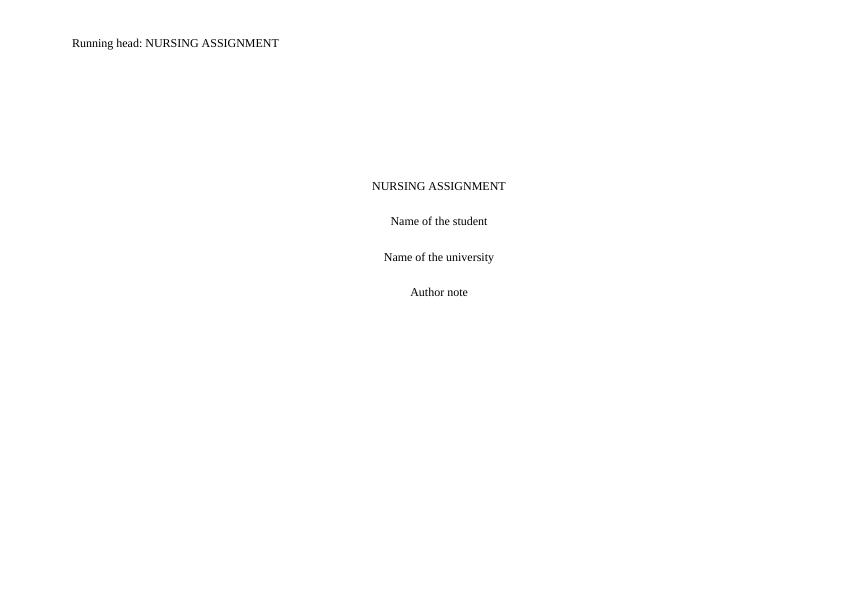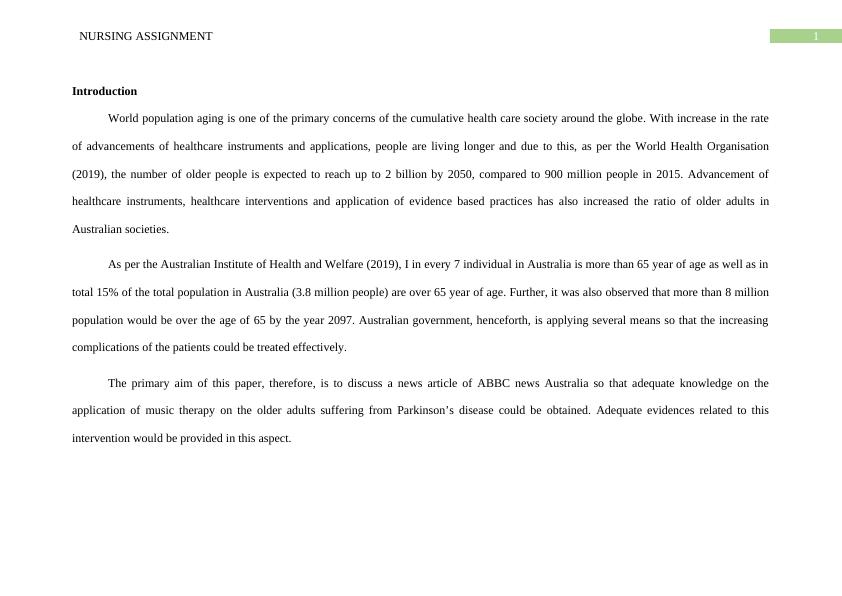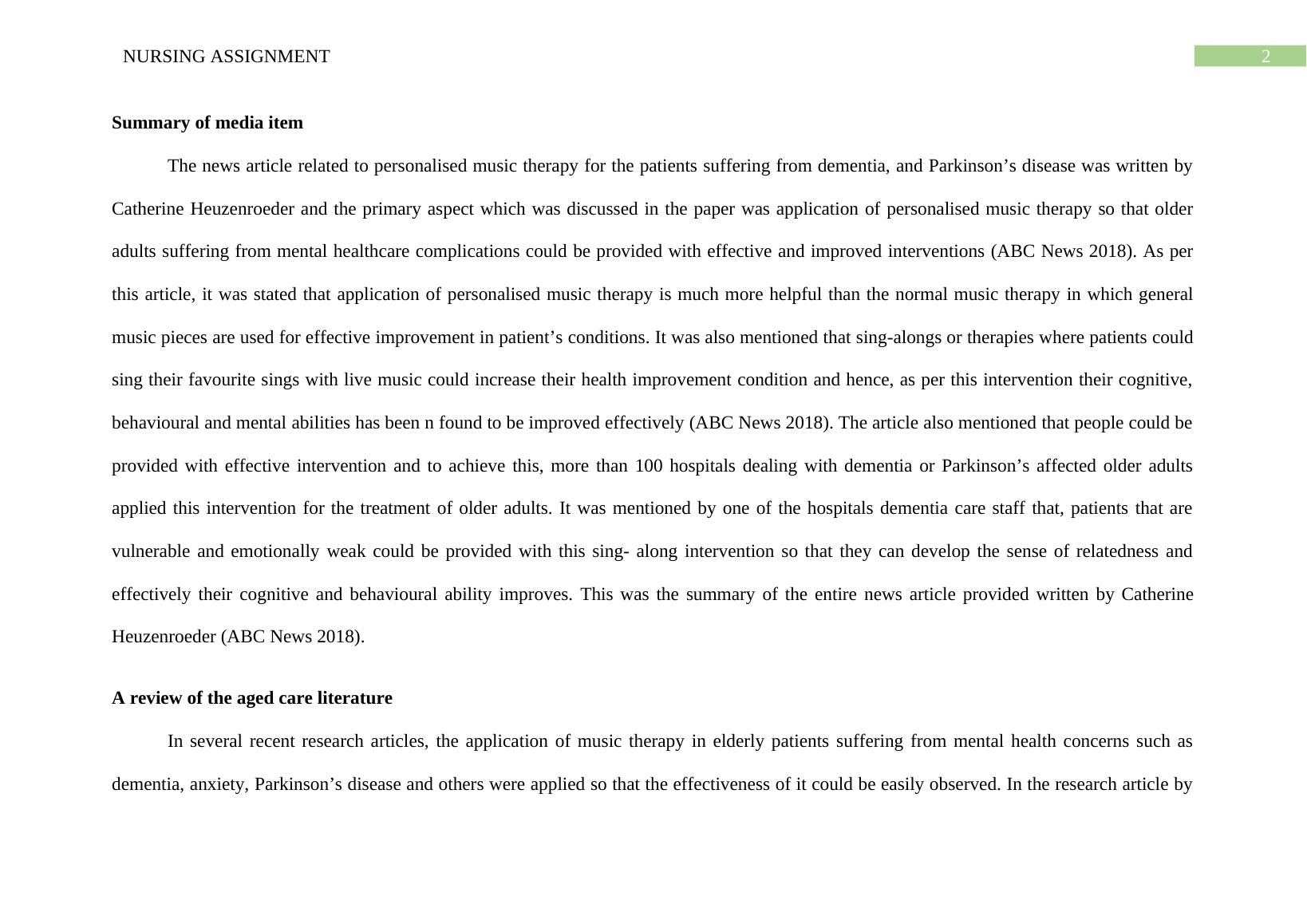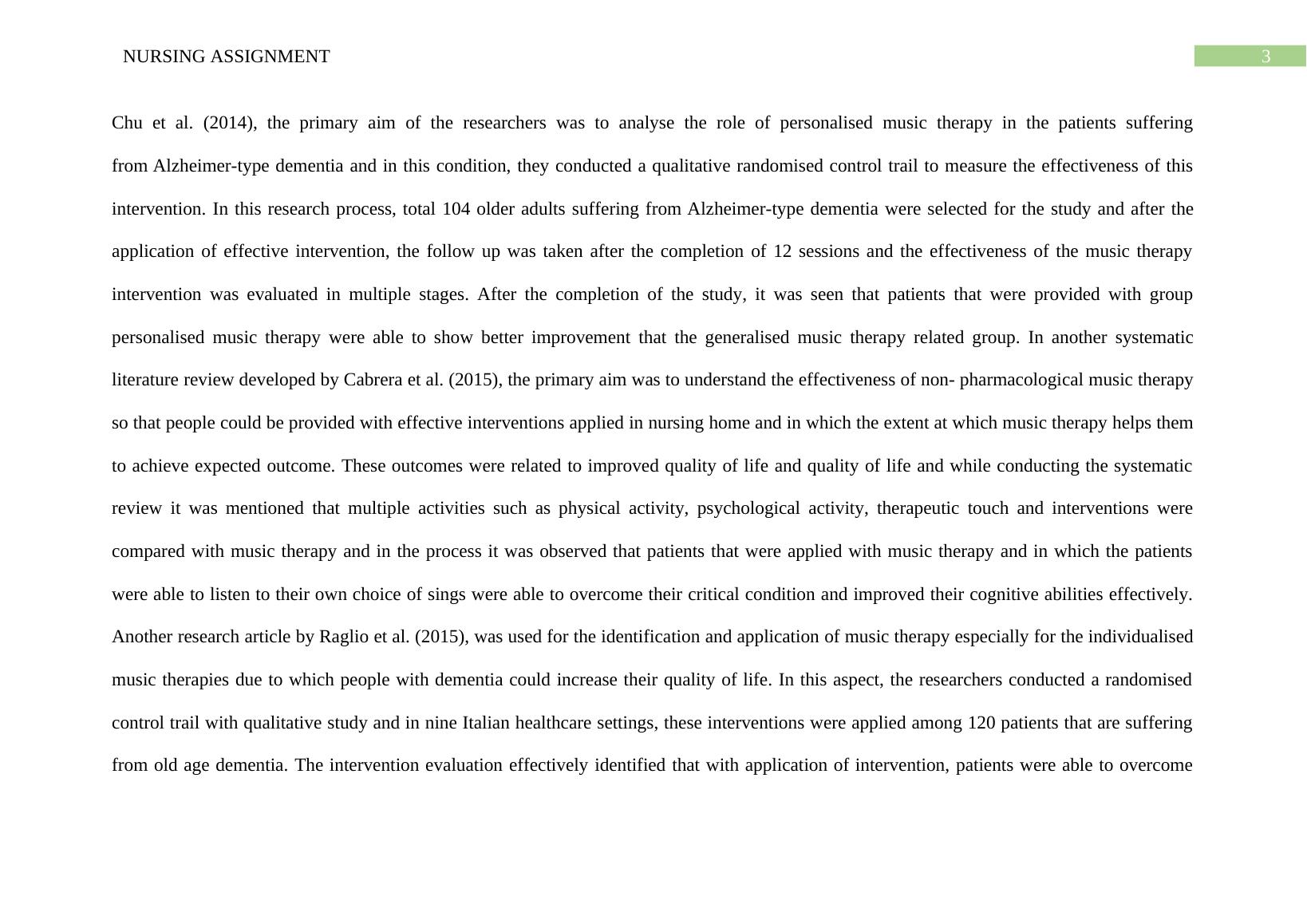Personalised Music Therapy for Older Adults with Parkinson's Disease and Dementia
Added on 2023-04-19
14 Pages3054 Words282 Views
Running head: NURSING ASSIGNMENT
NURSING ASSIGNMENT
Name of the student
Name of the university
Author note
NURSING ASSIGNMENT
Name of the student
Name of the university
Author note

1NURSING ASSIGNMENT
Introduction
World population aging is one of the primary concerns of the cumulative health care society around the globe. With increase in the rate
of advancements of healthcare instruments and applications, people are living longer and due to this, as per the World Health Organisation
(2019), the number of older people is expected to reach up to 2 billion by 2050, compared to 900 million people in 2015. Advancement of
healthcare instruments, healthcare interventions and application of evidence based practices has also increased the ratio of older adults in
Australian societies.
As per the Australian Institute of Health and Welfare (2019), I in every 7 individual in Australia is more than 65 year of age as well as in
total 15% of the total population in Australia (3.8 million people) are over 65 year of age. Further, it was also observed that more than 8 million
population would be over the age of 65 by the year 2097. Australian government, henceforth, is applying several means so that the increasing
complications of the patients could be treated effectively.
The primary aim of this paper, therefore, is to discuss a news article of ABBC news Australia so that adequate knowledge on the
application of music therapy on the older adults suffering from Parkinson’s disease could be obtained. Adequate evidences related to this
intervention would be provided in this aspect.
Introduction
World population aging is one of the primary concerns of the cumulative health care society around the globe. With increase in the rate
of advancements of healthcare instruments and applications, people are living longer and due to this, as per the World Health Organisation
(2019), the number of older people is expected to reach up to 2 billion by 2050, compared to 900 million people in 2015. Advancement of
healthcare instruments, healthcare interventions and application of evidence based practices has also increased the ratio of older adults in
Australian societies.
As per the Australian Institute of Health and Welfare (2019), I in every 7 individual in Australia is more than 65 year of age as well as in
total 15% of the total population in Australia (3.8 million people) are over 65 year of age. Further, it was also observed that more than 8 million
population would be over the age of 65 by the year 2097. Australian government, henceforth, is applying several means so that the increasing
complications of the patients could be treated effectively.
The primary aim of this paper, therefore, is to discuss a news article of ABBC news Australia so that adequate knowledge on the
application of music therapy on the older adults suffering from Parkinson’s disease could be obtained. Adequate evidences related to this
intervention would be provided in this aspect.

2NURSING ASSIGNMENT
Summary of media item
The news article related to personalised music therapy for the patients suffering from dementia, and Parkinson’s disease was written by
Catherine Heuzenroeder and the primary aspect which was discussed in the paper was application of personalised music therapy so that older
adults suffering from mental healthcare complications could be provided with effective and improved interventions (ABC News 2018). As per
this article, it was stated that application of personalised music therapy is much more helpful than the normal music therapy in which general
music pieces are used for effective improvement in patient’s conditions. It was also mentioned that sing-alongs or therapies where patients could
sing their favourite sings with live music could increase their health improvement condition and hence, as per this intervention their cognitive,
behavioural and mental abilities has been n found to be improved effectively (ABC News 2018). The article also mentioned that people could be
provided with effective intervention and to achieve this, more than 100 hospitals dealing with dementia or Parkinson’s affected older adults
applied this intervention for the treatment of older adults. It was mentioned by one of the hospitals dementia care staff that, patients that are
vulnerable and emotionally weak could be provided with this sing- along intervention so that they can develop the sense of relatedness and
effectively their cognitive and behavioural ability improves. This was the summary of the entire news article provided written by Catherine
Heuzenroeder (ABC News 2018).
A review of the aged care literature
In several recent research articles, the application of music therapy in elderly patients suffering from mental health concerns such as
dementia, anxiety, Parkinson’s disease and others were applied so that the effectiveness of it could be easily observed. In the research article by
Summary of media item
The news article related to personalised music therapy for the patients suffering from dementia, and Parkinson’s disease was written by
Catherine Heuzenroeder and the primary aspect which was discussed in the paper was application of personalised music therapy so that older
adults suffering from mental healthcare complications could be provided with effective and improved interventions (ABC News 2018). As per
this article, it was stated that application of personalised music therapy is much more helpful than the normal music therapy in which general
music pieces are used for effective improvement in patient’s conditions. It was also mentioned that sing-alongs or therapies where patients could
sing their favourite sings with live music could increase their health improvement condition and hence, as per this intervention their cognitive,
behavioural and mental abilities has been n found to be improved effectively (ABC News 2018). The article also mentioned that people could be
provided with effective intervention and to achieve this, more than 100 hospitals dealing with dementia or Parkinson’s affected older adults
applied this intervention for the treatment of older adults. It was mentioned by one of the hospitals dementia care staff that, patients that are
vulnerable and emotionally weak could be provided with this sing- along intervention so that they can develop the sense of relatedness and
effectively their cognitive and behavioural ability improves. This was the summary of the entire news article provided written by Catherine
Heuzenroeder (ABC News 2018).
A review of the aged care literature
In several recent research articles, the application of music therapy in elderly patients suffering from mental health concerns such as
dementia, anxiety, Parkinson’s disease and others were applied so that the effectiveness of it could be easily observed. In the research article by

3NURSING ASSIGNMENT
Chu et al. (2014), the primary aim of the researchers was to analyse the role of personalised music therapy in the patients suffering
from Alzheimer-type dementia and in this condition, they conducted a qualitative randomised control trail to measure the effectiveness of this
intervention. In this research process, total 104 older adults suffering from Alzheimer-type dementia were selected for the study and after the
application of effective intervention, the follow up was taken after the completion of 12 sessions and the effectiveness of the music therapy
intervention was evaluated in multiple stages. After the completion of the study, it was seen that patients that were provided with group
personalised music therapy were able to show better improvement that the generalised music therapy related group. In another systematic
literature review developed by Cabrera et al. (2015), the primary aim was to understand the effectiveness of non- pharmacological music therapy
so that people could be provided with effective interventions applied in nursing home and in which the extent at which music therapy helps them
to achieve expected outcome. These outcomes were related to improved quality of life and quality of life and while conducting the systematic
review it was mentioned that multiple activities such as physical activity, psychological activity, therapeutic touch and interventions were
compared with music therapy and in the process it was observed that patients that were applied with music therapy and in which the patients
were able to listen to their own choice of sings were able to overcome their critical condition and improved their cognitive abilities effectively.
Another research article by Raglio et al. (2015), was used for the identification and application of music therapy especially for the individualised
music therapies due to which people with dementia could increase their quality of life. In this aspect, the researchers conducted a randomised
control trail with qualitative study and in nine Italian healthcare settings, these interventions were applied among 120 patients that are suffering
from old age dementia. The intervention evaluation effectively identified that with application of intervention, patients were able to overcome
Chu et al. (2014), the primary aim of the researchers was to analyse the role of personalised music therapy in the patients suffering
from Alzheimer-type dementia and in this condition, they conducted a qualitative randomised control trail to measure the effectiveness of this
intervention. In this research process, total 104 older adults suffering from Alzheimer-type dementia were selected for the study and after the
application of effective intervention, the follow up was taken after the completion of 12 sessions and the effectiveness of the music therapy
intervention was evaluated in multiple stages. After the completion of the study, it was seen that patients that were provided with group
personalised music therapy were able to show better improvement that the generalised music therapy related group. In another systematic
literature review developed by Cabrera et al. (2015), the primary aim was to understand the effectiveness of non- pharmacological music therapy
so that people could be provided with effective interventions applied in nursing home and in which the extent at which music therapy helps them
to achieve expected outcome. These outcomes were related to improved quality of life and quality of life and while conducting the systematic
review it was mentioned that multiple activities such as physical activity, psychological activity, therapeutic touch and interventions were
compared with music therapy and in the process it was observed that patients that were applied with music therapy and in which the patients
were able to listen to their own choice of sings were able to overcome their critical condition and improved their cognitive abilities effectively.
Another research article by Raglio et al. (2015), was used for the identification and application of music therapy especially for the individualised
music therapies due to which people with dementia could increase their quality of life. In this aspect, the researchers conducted a randomised
control trail with qualitative study and in nine Italian healthcare settings, these interventions were applied among 120 patients that are suffering
from old age dementia. The intervention evaluation effectively identified that with application of intervention, patients were able to overcome

End of preview
Want to access all the pages? Upload your documents or become a member.
Related Documents
Music Therapy and Alzheimer's Disease: A Reviewlg...
|10
|2263
|154
Assignment on the Nursing 2022lg...
|6
|948
|19
Speech Therapy for Old Age Patients in Healthcare Settingslg...
|15
|3489
|346
NURBN2008 - Nursing Dementia Patient : Essaylg...
|14
|3885
|913
The Use of Antidepressants in Dementia in the Elderly in Nursing Homeslg...
|52
|13064
|74
PICO Question and Search Strategylg...
|5
|838
|359
